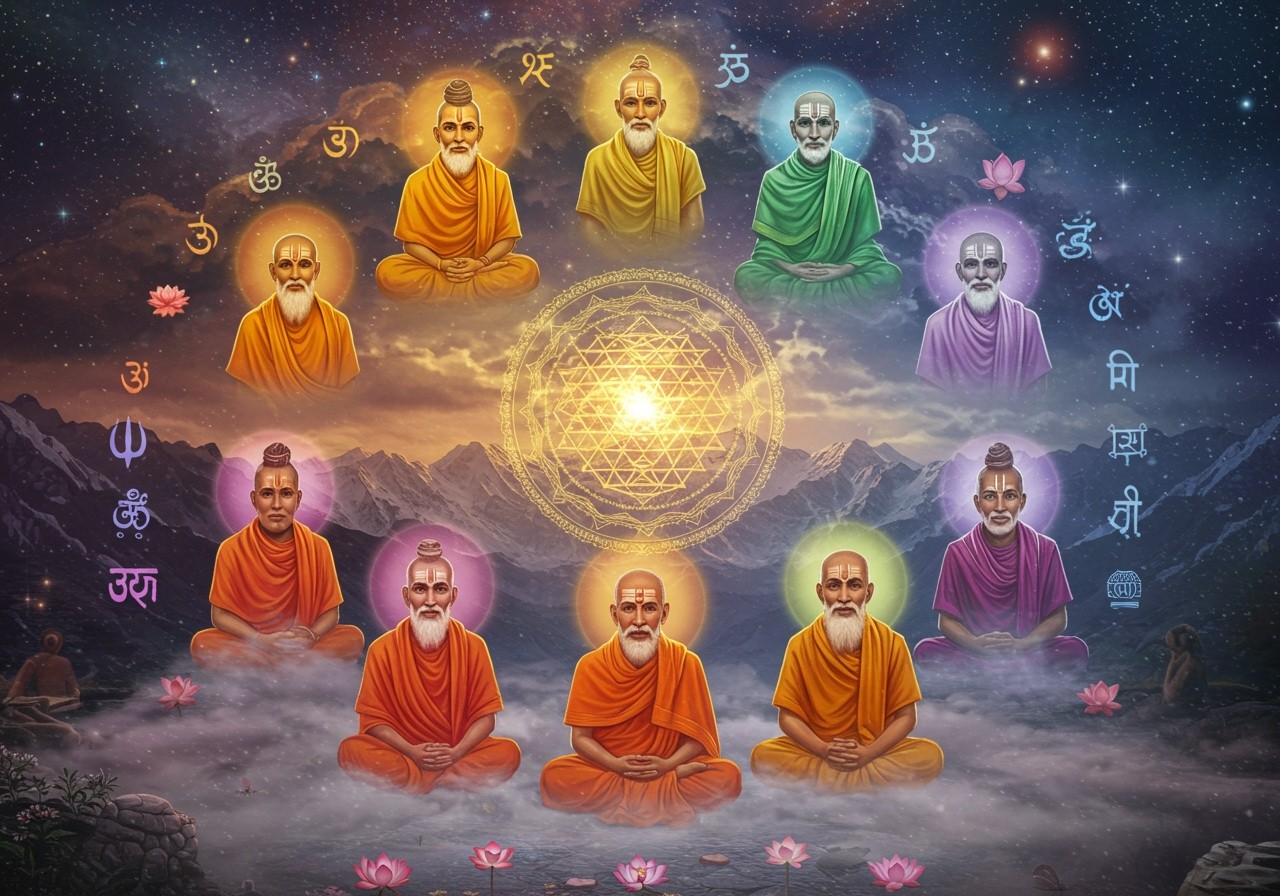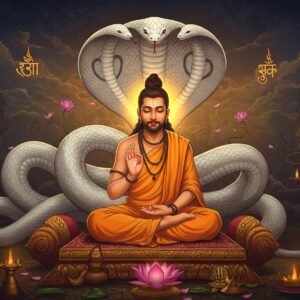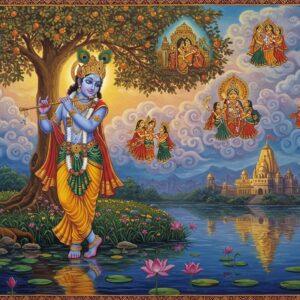Exploring Dashnami Sannyasa: A Path of Renunciation in Hinduism

Exploring Dashnami Sannyasa invites us into a world of deep spiritual practice and tradition. This path of renunciation in Hinduism, shaped over centuries, focuses on spiritual growth and detachment from material life. Learn about the ten distinct orders within this tradition and their unique routes to enlightenment. Understand the influence of Adi Shankaracharya in structuring these paths and get introduced to concepts like ‘Tridanda Sannyasa’ and ‘Sannyasa Danda’.
Historical Context and Origins
The origins of Dashnami Sannyasa trace back to the 8th century with Adi Shankaracharya. He established ten orders to unify diverse ascetic practices under a single philosophical system. Shankaracharya set up monastic centers, known as ‘Mathas‘, across India. Each Matha, linked to one of the ten orders, plays a vital role in preserving Vedanta teachings. These Mathas emphasize knowledge, meditation, and disciplined asceticism. Dashnami Sannyasa stands out for its structured hierarchy, differentiating it from other Hindu renunciation traditions. The focus is on spiritual wisdom and a disciplined way of life, ensuring the continuity of these ancient teachings.
The Ten Orders of Dashnami Sannyasa
Established by Adi Shankaracharya, the Dashnami Sannyasa tradition is rich with diversity, encompassing ten unique orders. Each offers a distinct path toward spiritual enlightenment: Aranya, Ashrama, Bharati, Giri, Parvata, Puri, Saraswati, Sagara, Tirtha, and Vana. Each name holds symbolic meaning. ‘Giri’ symbolizes stability and firmness, emphasizing grounding oneself in spiritual wisdom. ‘Saraswati’ represents the pursuit of knowledge, highlighting learning and understanding. Geographically, these orders connect with different Mathas across India, ensuring the preservation and propagation of spiritual teachings. The Mathas serve as centers of learning and meditation. Within the broader Dashnami system, each order has distinct roles and duties, influencing daily practices, attire, and spiritual focus. Some orders may emphasize meditation, while others focus on teaching. ‘Diksha’, the initiation into an order, marks the formal beginning of a sannyasi’s spiritual journey. This ceremony symbolizes the renunciation of worldly life and commitment to spiritual goals.
Learn more about Hinduism and its traditions.
Tridanda Sannyasa and Sannyasa Danda
In the Dashnami tradition, ‘Tridanda Sannyasa‘ represents a form of renunciation where the ascetic carries a tridanda, a three-pronged staff. This staff symbolizes control over body, speech, and mind, serving as a constant reminder of their commitment to spiritual discipline. The ‘Sannyasa Danda‘, or staff, signifies authority and spiritual discipline. Utilized in rituals and meditation, it guides sannyasis in their spiritual practices, helping maintain focus on their path of renunciation. Tridanda Sannyasa differs from Ekadanda Sannyasa, which involves carrying a single staff. Each has unique philosophical underpinnings, reflecting varied approaches to spiritual discipline. The danda is crucial in daily spiritual practices, not just a symbol but a tool for teaching and meditation. It reminds sannyasis of their vow of renunciation and their spiritual goals. Find products related to Hindu rituals at poojn.in.
Lifestyle and Practices of Dashnami Sannyasis
A Dashnami Sannyasi’s lifestyle centers around simplicity, celibacy, and non-attachment. They live without material possessions, prioritizing spiritual growth. Their daily routine includes meditation, studying scriptures, and performing rituals. ‘Bhiksha‘, receiving alms, provides sustenance and teaches humility, reinforcing the idea of living without attachment to material goods. Pilgrimage and travel to holy sites are part of their spiritual discipline, offering opportunities for reflection and deeper connection with their faith. ‘Mouna‘, or silence, serves as a tool for meditation and self-awareness, deepening their understanding of themselves and their spiritual path. ‘Vairagya‘, or detachment, is central to their lives, encouraging them to let go of worldly desires and focus on spiritual goals. Living in a Matha brings communal aspects to their life, fostering a sense of community and shared purpose through collective worship and study. Explore a wide range of spiritual products at poojn.in.
Significance and Contemporary Relevance
Dashnami Sannyasa holds enduring relevance today. In modern times, many seekers look beyond material success for deeper meaning. The principles of renunciation and detachment offer guidance for these individuals. Dashnami Sannyasis serve as spiritual leaders and educators, guiding those seeking enlightenment and spiritual growth. The tradition has adapted to modernity while preserving core values. With rising interest in spiritual tourism, Dashnami Sannyasa has gained global attention. Sannyasis contribute significantly to social and educational causes, using their influence to promote positive change. Technology plays a role in preserving and spreading Dashnami teachings, reaching a broader audience while keeping the tradition alive. Discover more about ancient wisdom for modern life at poojn.in.
How Poojn.in Supports Your Dashnami Sannyasa Needs
Poojn.in offers essential items and resources for those following or studying the Dashnami Sannyasa tradition. As India’s largest Dashakarma bhandar, we provide:
- Complete sannyasa ritual kits with all necessary items. These kits are designed to ensure you have everything required for traditional ceremonies.
- Pure cotton ochre robes (gerua vastram) crafted with high-quality materials and adherence to traditional standards. These robes symbolize renunciation and spiritual dedication.
- Rudraksha malas in different sizes, sourced for their authenticity and spiritual significance. Rudraksha beads are believed to carry powerful energy and aid in meditation.
- Sacred thread (yagnopavit), an essential item for Hindu rituals and ceremonies, symbolizing spiritual connection and purity.
- Kamandalu (water pot) and Danda (staff), crucial symbolic items for sannyasis, representing their commitment to a simple and spiritual life. These are crafted with respect for tradition and functionality.
- Pure copper items for rituals, ensuring purity and adherence to traditional practices. Copper is considered auspicious in Hindu rituals and is used in various ceremonies.
- Spiritual texts and scriptures provide guidance and deeper understanding of the Dashnami Sannyasa tradition. These resources offer valuable insights into the philosophy and practices of this ancient path.
Our products meet the highest standards of purity and authenticity required for sannyasa ceremonies. We source items from verified vendors who understand traditional requirements.
To order sannyasa-related items:
- Visit www.poojn.in
- Browse the Dashakarma items section.
- Select required products.
- Get doorstep delivery across India.
For guidance on specific items for Dashnami Sannyasa rituals, contact our support team at 91 3369029784. We ensure all products meet scriptural requirements while offering online shopping convenience.
Shop Sannyasa Items at Poojn.in
Embracing the Wisdom of Dashnami Sannyasa
The Dashnami Sannyasa tradition, with its ten sacred orders, offers a timeless journey of spiritual enlightenment. Rooted in the teachings of Adi Shankaracharya, these paths guide seekers toward inner peace and wisdom. Each order embodies unique values, encouraging personal growth and deeper connection with the divine. In today’s fast-paced world, the teachings of Dashnami Sannyasa emphasize simplicity and detachment. By embracing these principles, we can find balance and meaning beyond material pursuits. The sannyasis, dedicated to spiritual discipline, inspire us to explore our paths to enlightenment. We honor these ancient traditions and see their evolution. Through technology and global interest, Dashnami Sannyasa continues to reach and inspire new generations. This enduring legacy of wisdom and compassion invites us to seek a life of purpose and spiritual fulfillment.
FAQs on Dashnami Sannyasa: Understanding the Ten Names of Renunciation
What is Dashnami Sannyasa?
Dashnami Sannyasa, a Hindu monastic tradition, involves renouncing worldly life. It follows ten different names or orders, each representing a spiritual lineage.
How many orders are there in Dashnami Sannyasa?
There are ten orders in Dashnami Sannyasa, named after different spiritual lineages, signifying diverse paths of renunciation.
Why is Dashnami Sannyasa important?
Dashnami Sannyasa provides a structured spiritual path for those seeking a life of renunciation and spiritual growth, following Adi Shankaracharya’s teachings.
What does ‘Tridanda Sannyasa’ mean?
‘Tridanda Sannyasa’ is a form of renunciation where a monk carries a tridanda (three-rod staff), symbolizing control over mind, body, and speech.
How is Sannyasa Danda used in Dashnami Sannyasa?
In Dashnami Sannyasa, the Sannyasa Danda (single staff) symbolizes renunciation and spiritual discipline, representing commitment to their spiritual path.
Who can take up Dashnami Sannyasa?
Traditionally, those wishing to renounce worldly life completely take up Dashnami Sannyasa, requiring dedication to spiritual practices and teachings.
Which spiritual leader established the Dashnami Sannyasa tradition?
Adi Shankaracharya, a revered Indian philosopher and theologian, established the Dashnami Sannyasa tradition to preserve and promote Advaita Vedanta’s teachings.


